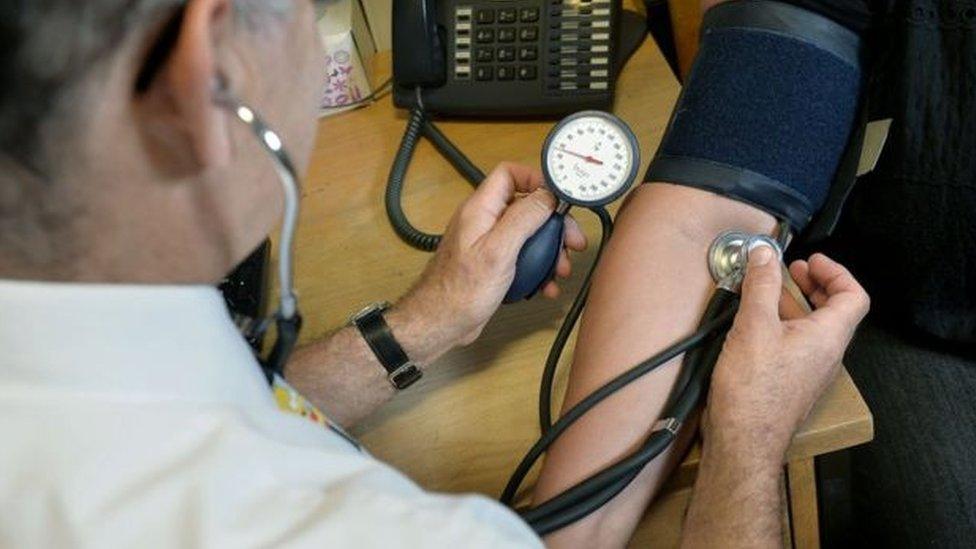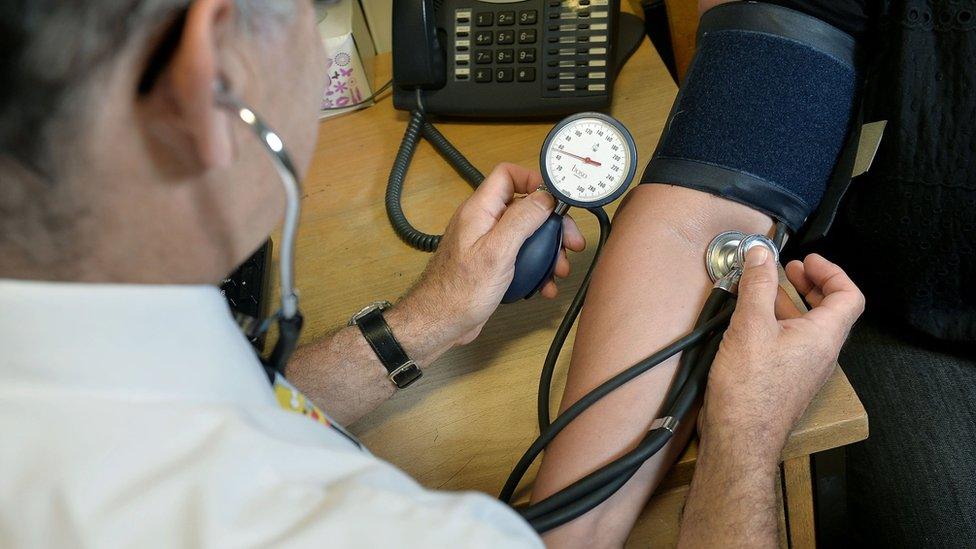Key points of the health trust's £70m cost-saving proposals
- Published

The trusts revealed their proposals on Thursday afternoon
Health trusts across Northern Ireland are being asked save about £70m by the Department of Health.
At five separate meetings held on Thursday, each of the trusts unveiled their proposals.
In an unprecedented move they are putting them out to public consultation.
Here is a brief look at the key proposals outlined by the trusts and the possible impact each proposal may have.

Belfast Trust
Cuts to agency and locum staff. This would lead to the loss of 65 hospital beds and an extra six months on waiting lists
Fewer treatments for non-urgent elective care. Cancer would be protected. Could affect 2,000 day cases
Temporary reduction of domiciliary care packages for new clients from October. An estimated 365 clients would be affected. It would also lead to patients staying in hospital beds for longer, leading to more bed blocking for those in need of hospital care
Temporary halt to admissions to nursing and residential homes. Could potentially affect 230 people
Defer access for new clients to the regional fertility centre
Use less high-cost drug treatments in favour of more generic drug treatments
You can see the full consultation document here., external


The five trusts have been asked to deliver the savings by the Department of Health
Northern Trust
Cuts to agency and locum staff. This would lead to a reduction in beds in Antrim Hospital and Causeway Hospital.
Temporary closure of three rehabilitation wards in Whiteabbey hospital, including the day ward
Reduction in non-urgent elective day surgery. This would mean an increase in patient waiting times with 2,400 fewer operations. Cancer patients and urgent referrals would be protected
Manage growth of community placements and domiciliary care packages. This would not impact trust employed staff but rather affect domiciliary care provision from independent sector providers
An end to domiciliary care meals provision. The trust said alternative arrangements would be made for those still receiving meals
Car park price increases for visitors. It would see costs rise by 20p per hour for those parking less than an hour, and 30p for over an hour. This would be the first increase in two years
You can see the full consultation document here., external

Western Trust
Cuts to agency and locum staff. This would result in the closure of approximately 30 beds across medical and care of the elderly wards
A reduction in non-urgent elective day surgery. This would mean a reduction of almost 40 inpatient beds across South West Acute Hospital (SWAH) and Altnagelvin
Cap on locum pay
Reduction in domiciliary care and nursing home packages. Around £1.6m will be cut meaning approximately 275 care packages would not be put in place
Delays to service investment aimed at reforming and modernising trust services. This would not apply to learning disability and physical disability care programmes
Consolidation of services provided by William Street and Rectory Field Residential Homes. Based on prior consultation it will also consolidate services in and around Gortin, Dromore and Rosslea
You can see the full consultation document here., external


Each trust can act independently and have published their own set of proposals.
South Eastern Trust
A reduction in agency and locum staff. These cuts would see a decrease of agency staff by about 25%
The replacement of agency and locum staff with in-house staff
Deferral of money to develop services or produce new initiatives. This would include the new inpatient ward block at the Ulster Hospital. Although it has already opened, services are being transferred under a phased plan and may be slowed to save further money
An introduction of car parking charges at Ards Hospital
Natural delays in recruitment
You can see the full consultation document here, external.

Southern Trust
Delays in recruitment. This would impact business support roles within the Trust in department such as technology, human resource, and finance
Reduction in spending on non-medical equipment including furniture, printing and publications
Bulk buying of water filters to reduce overall cost
Home delivery of single use aids. This would replace the provision of such aids from local pharmacies through a voucher scheme. As a result pharmacies could lose out on revenue
You can see the full consultation document here, external.
- Published24 August 2017

- Published24 August 2017

- Published11 April 2017

- Published25 October 2016

- Published21 August 2014
